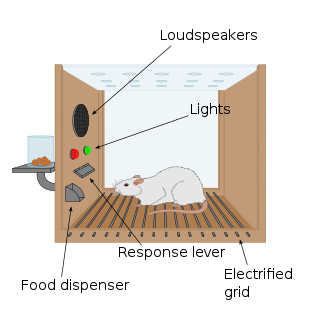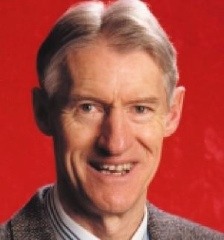Positions
This biographical section is written like a résumé .(August 2020) |
- 1981: President, British Psychological Society
- 1998-1999: Director General, International Baccalaureate
- 2004-2012: Vice-chair, International Board, United World Colleges
Derek Ernest Blackman | |
|---|---|
| Born | Derek Ernest Blackman |
| Nationality | British |
| Alma mater | University of Exeter; Queen's University of Belfast |
| Scientific career | |
| Fields | Experimental psychology |
| Institutions | University of Cardiff |
| Thesis | Some determinants of conditioned suppression in the rat (1966) |
Derek Ernest Blackman is a British psychologist whose research was concerned with the experimental analysis of learned behaviour.
Blackman obtained his BSc from the University of Exeter in 1966 followed by a PhD from Queen's University of Belfast in 1968. He was appointed to the Department of Psychology in the faculty of Science at the University of Birmingham before being appointed to the faculty at the University of Cardiff where he remained for the whole of his later academic career. He served as Head of Department and Dean in the Faculty of Science. He retired in 1998 as Emeritus Professor of Psychology.
He was active in the British Psychological Society of which he became president in 1981. After his retirement he was active in international education including involvement in the International Baccalaureate and in the United World Colleges. [1]
His research was concerned with the experimental analysis of learned behaviour. He authored a large number of journal articles, chapters and books.[ citation needed ]
This biographical section is written like a résumé .(August 2020) |

Burrhus Frederic Skinner was an American psychologist, behaviorist, author, inventor, and social philosopher. Considered the father of Behaviorism, he was the Edgar Pierce Professor of Psychology at Harvard University from 1958 until his retirement in 1974.
Operant conditioning, also called instrumental conditioning, is a learning process where behaviors are modified through the association of stimuli with reinforcement or punishment. In it, operants—behaviors that affect one's environment—are conditioned to occur or not occur depending on the environmental consequences of the behavior.

An operant conditioning chamber is a laboratory apparatus used to study animal behavior. The operant conditioning chamber was created by B. F. Skinner while he was a graduate student at Harvard University. The chamber can be used to study both operant conditioning and classical conditioning.
Radical behaviorism is a "philosophy of the science of behavior" developed by B. F. Skinner. It refers to the philosophy behind behavior analysis, and is to be distinguished from methodological behaviorism—which has an intense emphasis on observable behaviors—by its inclusion of thinking, feeling, and other private events in the analysis of human and animal psychology. The research in behavior analysis is called the experimental analysis of behavior and the application of the field is called applied behavior analysis (ABA), which was originally termed "behavior modification."
Associationism is the idea that mental processes operate by the association of one mental state with its successor states. It holds that all mental processes are made up of discrete psychological elements and their combinations, which are believed to be made up of sensations or simple feelings. In philosophy, this idea is viewed as the outcome of empiricism and sensationism. The concept encompasses a psychological theory as well as comprehensive philosophical foundation and scientific methodology.

Conwy Lloyd Morgan, FRS was a British ethologist and psychologist. He is remembered for his theory of emergent evolution, and for the experimental approach to animal psychology now known as Morgan's Canon, a principle that played a major role in behaviourism, insisting that higher mental faculties should only be considered as explanations if lower faculties could not explain a behaviour.
Behaviorism is a systematic approach to understanding the behavior of humans and other animals. It assumes that behavior is either a reflex evoked by the pairing of certain antecedent stimuli in the environment, or a consequence of that individual's history, including especially reinforcement and punishment contingencies, together with the individual's current motivational state and controlling stimuli. Although behaviorists generally accept the important role of heredity in determining behavior, they focus primarily on environmental events.
Behaviour therapy or behavioural psychotherapy is a broad term referring to clinical psychotherapy that uses techniques derived from behaviourism and/or cognitive psychology. It looks at specific, learned behaviours and how the environment, or other people's mental states, influences those behaviours, and consists of techniques based on behaviorism's theory of learning: respondent or operant conditioning. Behaviourists who practice these techniques are either behaviour analysts or cognitive-behavioural therapists. They tend to look for treatment outcomes that are objectively measurable. Behaviour therapy does not involve one specific method, but it has a wide range of techniques that can be used to treat a person's psychological problems.

[[File:|thumb|Michael Argyle]] Michael Argyle was one of the best known English social psychologists of the twentieth century. He spent most of his career at the University of Oxford, and worked on numerous topics. Throughout his career, he showed strong preferences for experimental methods in social psychology, having little time for alternative approaches such as discourse analysis.

Neal Elgar Miller was an American experimental psychologist. Described as an energetic man with a variety of interests, including physics, biology and writing, Miller entered the field of psychology to pursue these. With a background training in the sciences, he was inspired by professors and leading psychologists at the time to work on various areas in behavioral psychology and physiological psychology, specifically, relating visceral responses to behavior.
William Kaye Estes was an American psychologist. A Review of General Psychology survey, published in 2002, ranked Estes as the 77th most cited psychologist of the 20th century. In order to develop a statistical explanation for the learning phenomena, William Kaye Estes developed the Stimulus Sampling Theory in 1950 which suggested that a stimulus-response association is learned on a single trial; however, the learning process is continuous and consists of the accumulation of distinct stimulus-response pairings.
Murray Sidman was an American behavioral scientist, best known for Sidman Avoidance, also called "free-operant avoidance", in which an individual learns to avoid an aversive stimulus by remembering to produce the response without any other stimulus. Sidman's explanation of free-operant avoidance is an alternative to the Miller-Mowrer two-process theory of avoidance.
Psychological behaviorism is a form of behaviorism — a major theory within psychology which holds that generally human behaviors are learned — proposed by Arthur W. Staats. The theory is constructed to advance from basic animal learning principles to deal with all types of human behavior, including personality, culture, and human evolution. Behaviorism was first developed by John B. Watson (1912), who coined the term "behaviorism," and then B. F. Skinner who developed what is known as "radical behaviorism." Watson and Skinner rejected the idea that psychological data could be obtained through introspection or by an attempt to describe consciousness; all psychological data, in their view, was to be derived from the observation of outward behavior. The strategy of these behaviorists was that the animal learning principles should then be used to explain human behavior. Thus, their behaviorisms were based upon research with animals.
Francis Mechner is an American research psychologist best known for having developed and introduced a formal symbolic language for the codification and notation of behavioral contingencies. He has published articles about the language's applications in economics, finance, education, environment, business management, biology, clinical practice, and law. Mechner is also known for a variety of contributions to instructional technology and basic research in the field of learning.
Keith R. Laws is a professor of neuropsychology at the School of Psychology at the University of Hertfordshire. Professor Laws' research centres on how cognitive functions and processes relate to brain structure and function; notably for research on cognitive functioning in people suffering from neurological and psychiatric disorders. Laws, with his colleagues, created one of the first research groups to investigate impairment of everyday knowledge in patients with schizophrenia and to demonstrate worse cognitive outcomes in women suffering from Alzheimer's disease. Laws' work on the link between MDMA drug use and poor memory is the principal analysis of its kind to date, and has been broadly cited in both national and international media. In 2013 he published a study showing that women are better at multitasking than men. Laws completed a PhD at the Department of Experimental Psychology, University of Cambridge. He is the author of over 100 papers and a recent book entitled 'Category-Specificity: Evidence for Modularity of Mind'. He is a Chartered Psychologist, Associate Fellow of the British Psychological Society (AFBPsS), Fellow of the Higher Education Academy (FHEA), a Fellow of the Royal Society of Arts (FRSA) and various academic organisations including the British Neuropsychological Society, British Neuropsychiatric Association, Experimental Psychology Society. and an editor at PLOS ONE.

Dalbir Bindra FRSC was a Canadian neuropsychologist and a professor in the psychology department at McGill University (1949-1980). He is known for his contributions to the neurobiological study of motivation and behaviour and his two books on these topics; Motivation: A Systematic Reinterpretation (1959), and A Theory of Intelligent Behaviour (1976). He also served as chair of the McGill University Psychology Department.
Coaching psychology is a field of applied psychology that applies psychological theories and concepts to the practice of coaching. Its aim is to increase performance, self-actualization, achievement and well-being in individuals, teams and organisations by utilising evidence-based methods grounded in scientific research. Coaching psychology is influenced by theories in various psychological fields, such as humanistic psychology, positive psychology, learning theory and social psychology.
Robert John Audley was a British psychologist whose research was concerned with choice and decision-making.
Peter Harzem was a Turkish-American psychologist who specialised in the field of behavior analysis.
Harry M.B. Hurwitz was a Canadian psychologist who specialised in the field of behavior analysis.